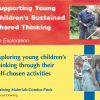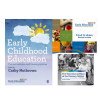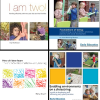Resisting intensified accountability: is now the time for inspection reform?
by Dr Jo Albin-Clark, Edge Hill University and Dr Nathan Archer, Leeds Beckett University Inspection in the news Being involved in education in England involves
The Ofsted early years curriculum review Best start in life part 1: setting the scene, has just been published, which they describe as being part of their series of “subject-based curriculum research reviews”. It aims to examine “the factors that contribute to a high-quality early education” and trails a future series of reviews which will focus on the seven areas of learning in the EYFS.
We welcome the statements about the essential role of play. We partially welcome the fact that it reasserts Ofsted’s long-established and well-constructed definition of teaching in the early years from the inspection handbook – with the caveat that it is missing the crucial first sentence of the original: “Teaching in the early years should not be taken to imply a “top down” or formal way of working.”
For most of the rest of the document we can give only a qualified welcome at best. If this is Ofsted’s attempt to set itself up as an expert on early years pedagogy and curriculum, it is unfortunate that it does the opposite. The report reads as if it relied solely on a small and incomplete review of the literature, not the rich and extensive research evidence available. It also fails to reflect the wealth of excellent practice in the sector which inspectors must be regularly encountering.
Given these limitations, it is important to note that the declaration that the report “sets out principles, specific to an area of learning, that can be used to support the quality of education judgement. The principles do not specify what must be taught or how” (our emphasis). However, the implicit threat of being downgraded for not complying with what is set out in the report will inevitably influence what and how settings and schools teach. It would be worrying if the principles in the report were to be applied by either practitioners or inspectors in a narrow or simplistic way. We set out below concerns about some of the specifics of the report.
Ofsted’s decision to state that this document is focused on birth to 4, and to include the reception year in its school research reviews is concerning as the EYFS principles cover the full birth to 5 age range, including the Reception year (and any children in year 1 who need ongoing EYFS provision to reach the Early Learning Goals). This perhaps reflects the split between Ofsted’s schools and EY framework, which is itself problematic in potentially applying different criteria to children who should be experiencing the same quality of provision.
This was a missed opportunity for Ofsted to state a unifying approach to early years across all types of provision, for all children in the early years foundation stage.
On a similar note, the report seems to struggle with the idea that early years provision in schools is part of the early years sector. It states, as if surprised or in disagreement: “The scope of the EYFS also means that teaching staff in maintained nursery schools, maintained nursery classes and reception classes are considered part of the early years workforce”. The use of the word “considered” here is unnecessary and unfortunate: these staff are unequivocally part of the early years workforce. While recognising the diversity and complexity of the early years workforce is important, this report manages to hit the wrong note.
There are occasional inaccuracies in the report, which should not have slipped past anyone with a basic knowledge of the early years such as that “In 2021, 62% of 2-year-olds … took up a place in a formal early education setting”. That should of course state “62% of eligible 2-year-olds took up a government-funded place in an early education setting”.
While the report sets out the filters used for selecting research reviewed, these do not seem to explain the selection of research references included. It is not enough to assert that “This is not a systematic literature review. When selecting literature, we draw on research that aligns with the criteria for high-quality education, published in our education inspection framework (EIF) and summarised in our ‘Education inspection framework: overview of research”
For instance, although the context section references the importance of staff-child relationships, this does not appear to be referenced in the principles section and there is no reference to the significant research on the role of the adult for example on Sustained Shared Thinking (Siraj et al), Professional Love (Page), the role of the key person (Elfer et al) or the adult-child interactions (Fisher). These are significant omissions for any research review which claims to set out principles for high quality pedagogy.
The problematic nature of the Ofsted definition of curriculum has been much written about. Even if we accept that Ofsted is intentionally choosing a narrow definition of curriculum rather than the all-embracing one, it is still unsatisfactory. Trying to stretch a single definition across all phases of education simply puts it under too much strain, and when applied to children under 5 – especially babies and toddlers – it breaks. The review includes statements that:
“What matters is that leaders and practitioners have considered what knowledge they want children to learn and the order in which to teach it, as well as which methods are most effective for teaching.”
“Progress in curricular terms means knowing more and remembering more”
Neither of these definitions is a good fit for the early years. There is a good reason why the EYFS uses the concepts of development and learning, which are not simply about remembering or knowing what – or even knowing how. Children in the early years are also developing their capabilities – as is recognised in the cognitive science research Ofsted quotes in the review.
The non-linear nature of learning and development in the early years is also at odds with the Ofsted focus on progression. It does not mean that there is no sequence at all, but it does mean that that Ofsted’s language needs to recognise the fluid and flexible processes of learning and development and how practitioners develop curricula accordingly.
Astonishingly, in the section on “How children learn and cognitive science” and the section on Executive Function, the review makes no mention of the Characteristics of Effective Teaching and Learning, which are core to the EYFS Statutory Framework and underpin practitioners understanding of early years pedagogy. Instead, it references only breakthroughs in cognitive science.
While cognitive science often confirms and potentially adds to what we know to be good pedagogical practice in the early years, it is only one of many fields which supports our understanding of teaching and learning in the early years. Moreover, cognitive science research is sometimes misapplied: cognitive scientists have advised caution that the research results are often from lab conditions not real life, and cannot be assumed to apply to other contexts – for instance to a younger age range than those in the original research.
While the importance of Executive Function is recognised in the early years, by failing to connect this section with the Characteristics of Learning or the concept of Self-Regulation as recently added to the EYFS Statutory Framework, the review risks adding further confusion to a complex concept. As discussed in the previous paragraph, it also needs to take care that the concepts and research it cites are relevant to this age group: a study conducted with undergraduates does not provide evidence that for how children aged 4 and under learn.
It is unfortunate that the review’s examples of practice are not well chosen or explained. Take this one:
“For example, learning about kings, castles and knights from traditional story books, together with language such as ’a long time ago’, helps children to develop foundational knowledge for learning history later on.”
This is a very simplistic and inadequate reference to the complex process by which children might come to develop an understanding of history. Amongst other things, this requires the concept of time which as we know develops from the very immediate and experiential (how many sleeps), through understanding time through the experience of family members (parents, grandparents) and their surroundings and community – and yes, also through books and stories. Such a brief and inadequate is example is not helpful.
The examples about teaching children to throw and catch, or theming activities around the “Bear Hunt” have been critiqued on social media already, so we will not address them here, or the problematic use of the term cultural capital.
The review’s suggestion that practitioners would limit children to their existing interests and not give opportunities to develop new ones is bizarre. Such a misinterpretation of what it means to “follow children’s interests” casts into question whether the authors have real-life experience of the early years sector. It is implausible to think that settings are restricting children only to those areas of interests that they initially exhibit, when the concept of using children’s interests is about gaining engagement to widen and deepen children’s knowledge. The interconnectedness of learning in the early years means that almost anything can be a starting point for all the areas of learning, and the characteristics of effective learning too. Engaging one child’s interest as a starting point is also an opportunity to spread that enthusiasm to other children whose own interests are different. If this is an attempt to encourage widening the breadth of children’s experiences, it is not well-directed, important as that point may be.
While we welcome the review’s recognition of the importance of play, this section is also a poor reflection of the complex and nuanced literature on the topic.
Referring to play at home as an example of “completely unguided” play is sloppy, as this completely overlooks role of parents and carers as adult participants in children’s play whose input may be guiding learning. Play is rarely completely unguided when an adult is present.
Oversimplification and overgeneralisation is evident in statements such as:
“In a mathematical context, for example, studies have indicated that play is important for encouraging interest and enthusiasm, but that some guided instruction from a teacher is also needed, as this provides structure to the learning.[footnote 67] Otherwise, children do not make connections between what they are playing with and mathematical ideas.”
This does not do justice to the complexity of interaction between children’s play, the role of the adult and the development of mathematical thinking and understanding.
On the basis of this review, before Ofsted publishes its reviews of the seven areas of learning, it would be well advised to trial them with knowledgeable and experienced practitioners and researchers. We would be delighted to help ensure that they make a more effective contribution to the debate about quality than the current review manages to do.
by Dr Jo Albin-Clark, Edge Hill University and Dr Nathan Archer, Leeds Beckett University Inspection in the news Being involved in education in England involves
Ofsted’s latest annual review highlights the impact of recruitment and retention challenges and finds a link between inspection outcomes and the proportion of graduates in
The open letter below was sent to Ofsted in November 2023. Download Ofsted’s response We the undersigned are writing to you about the recently published
Raymond Williams maintained, after years of examining constructs of culture and society that “Culture is one of the two or three most complicated words in






Early Education
2 Victoria Square
St Albans
AL1 3TF
T: 01727 884925
E: office@early-education.org.uk